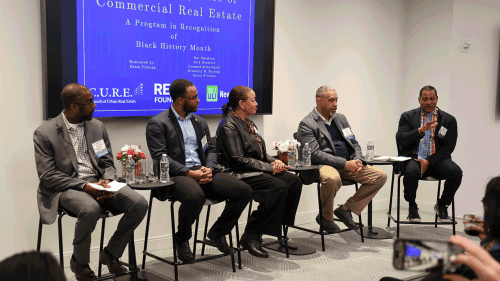Almost all commercial real estate firms have diversity, equity, and inclusion (DEI) initiatives in place in their organizations, with the number of firms adopting formal strategies increasing 5 percent year-over-year, according to the third edition of the Global Real Estate DEI Survey released in January.
The Global Real Estate DEI Survey shows almost 96 percent of firms have DEI policies and practices in place in their firms, with 56.4 percent enacting formal strategies. That marks a 5 percent YoY increase in firms approving documented, holistic DEI programs. Just 4.2 percent of firms do not have DEI programs or initiatives, the results reveal.
- The Global Real Estate DEI Survey, now supported by 19 commercial real estate industry associations globally, tracked DEI practices and employee demographics at 216 firms and was conducted between July and September 2023.
- The Survey represents 296,902 full-time real estate employees, $1.98 trillion of assets under management, and a cross-section of the commercial real estate industry globally in terms of size, region and business type.
Key highlights from the Global Real Estate DEI Survey show commercial real estate firms are increasingly focused on attracting more underrepresented people to the industry as a whole—with 31.6 percent of firms saying the most impactful DEI policy in 2023 was creating scholarships and internships to increase diversity in candidate pools, up from just 18 percent of firms the year prior.
In terms of employee demographics, headline data shows the representation of women in commercial real estate ranged from 39.8 percent to 45.6 percent across the four regions surveyed, which comprise Asia-Pacific, Europe, Canada, and the United States.
Read the key findings and executive summary of the Global Real Estate DEI Survey, Volume III on ULI’s Knowledge Finder.
Note: YoY changes throughout could be the result of changes in the sample of responding firms.
Regional snapshots:
For US firms, which represent 69.5 percent of Survey respondents, key highlights include:
- 41.4 percent of FTEs in commercial real estate in the United States are women, while almost 30 percent of employees are from underrepresented racial/ethnic groups.
- The underrepresented race/ethnicity group with the highest percentage of FTEs is Asian (9.8), followed by Hispanic/Latino (9.4) and Black or African American (7.2). Women in the US made gains at the most senior levels of commercial real estate in 2023, with women representing almost 26 percent of executive management positions up from 23 percent in 2022.
- At the board of directors level, the representation of people of color increased more than 50 percent rising to almost 15 percent of all board roles—up from just 9 percent in 2022.
- The top 10 roles held by men, women, white professionals and people of color are also listed. See the attached PDF for more details.
The Global Real Estate DEI Survey reports employee demographics for Canada for the first time.
For firms with employees in Canada, which represent 18.6 percent of respondents, key highlights include:
- 45.6 percent of all employees are women – the highest for any region surveyed. Data on ethnicity is not collected for Canada, Asia Pacific, or Europe.
- 27.4 percent of board of director positions in Canada are held by women, the highest for any region.
- Women at Canadian CRE firms comprised nearly half of all mid-level promotions (48.4%) and hires (47.6%) in 2023, exceeding the representation of women at that level of seniority.
- Note that to increase the representation of women or people of color at any level of seniority, hiring, and promotions should materially exceed the baseline employee population for that group.
In Europe, which represents 11.9 percent of respondents, key highlights include:
- 39.8 percent of all commercial real estate roles in Europe are held by women, with women making the most gains in 2023 at the executive management.
- 25.4 percent of executive management roles are held by women, up from 12.9 percent in the year prior.
- European firms also actively hired and promoted women for the most senior roles in their organizations in 2023. At the executive management and senior level, firms promoted and hired more women than was currently represented helping to move the needle on representation YoY.
In the Asia-Pacific region, which represents 8.9 percent of respondents, key highlights include:
- 44.8 percent of employees are women, with Asia-Pacific firms actively promoting more women to executive management roles and hiring women to mid-level roles in 2023.
- Similar to other regions, the proportion of women declines as we move up the organizational hierarchy, from women representing 52 percent of roles at the junior level to 41.9 percent at the mid-level and gradually decreasing to 17.3 percent at the board level.
Other key findings from the Global Real Estate DEI Survey Volume III include:
- Budgets: Dedicated DEI budgets are increasingly important for improving representation by underrepresented groups. In 2023, 36.3 percent of firms had dedicated DEI budgets, up from 30.4 percent in 2022—a YoY increase of 19 percent.
- Dimensions of diversity: Nine out of 10 respondents address race/ethnicity/nationality within their DEI programs followed by gender, sexual orientation and age. More firms are also tracking family status in 2023 than in the prior year, while firms tracking mental health conditions has also increased.
- Impact: Providing DEI-related training is the second most impactful DEI policy after creating scholarships and internships. One quarter of firms have seen training have the greatest impact on achieving DEI goals, up from 14.6% YoY.
- Inclusion: Promoting inclusive social events is the most common strategy for promoting an inclusive work culture, with almost 9 out of 10 firms adopting the policy in 2023 or planning to implement it in the next 12 months.
- Pay equity: CRE firms are working to increase the level of pay transparency at their organizations, with 62.9 percent analyzing gender pay gaps and 52.8 percent using redemption strategies. Pay equity initiatives being implemented include annual compensation review, benchmarking against industry data, using job bands to determine salaries, and working with a third party to analyze pay levels.





